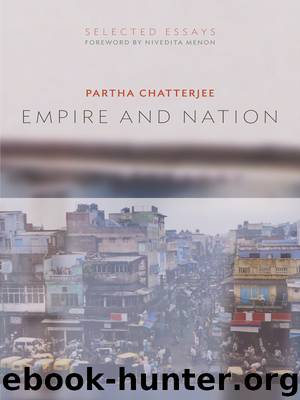Empire and Nation by Partha Chatterjee

Author:Partha Chatterjee
Language: eng
Format: epub
Tags: History/Asia/General
Publisher: Columbia University Press
Published: 2011-11-15T16:00:00+00:00
Delivered as the Saadat Hasan Manto Lecture at the Centre for the Study of Developing Societies, Delhi, in January 2000.
1 Lloyd I. Rudolph and Susanne Hoeber Rudolph, In Pursuit of Lakshmi: The Political Economy of the Indian State (Chicago: University of Chicago Press, 1987).
2 M.S.A. Rao and Francine Frankel, Dominance and State Power in India: Decline of a Social Order, 2 vols (Delhi: Oxford University Press, 1990).
3 Atul Kohli, Democracy and Discontent: India’s Growing Crisis of Governability (Cambridge: Cambridge University Press, 1991).
4 Partha Chatterjee, ‘Beyond the Nation? Or Within?’ Social Text, Autumn 1998. Reproduced in the present book as ch. 10 above; idem,‘Community in the East’, Economic and Political Weekly, January 1998; idem, ‘The Wages of Freedom’, in Partha Chatterjee, ed., The Wages of Freedom: Fifty Years of the Indian Nation-State (Delhi: Oxford University Press, 1998); idem, ‘Two Poets and Death: On Civil and Political Society in the Non-Christian World’, in Tim Mitchell and Lila Abu-Lughod, eds, Questions of Modernity (Minneapolis: University of Minnesota Press, 2000).
5 For arguments of this kind, see Jean L. Cohen and Andrew Arato, Civil Society and Political Theory (Cambridge, MA: MIT Press, 1992).
6 This example is discussed in Chatterjee, ‘Community in the East’, Economic and Political Weekly, 33, 6 (7 February 1998).
7 I am grateful to Ashok Dasgupta and Debashis Bhattacharya of Ajkal for their generous help in researching the story of Balak Brahmachari’s death.
8 Ajkal, 18 May 1993.
9 Ibid., 21 June 1993.
10 Ibid., 26 June 1993.
11 Ibid.
12 The Telegraph, 1 July 1993; The Statesman, 1 July 1993.
13 Ajkal, 2 July 1993.
14 Ibid., 13 July 1993.
15 Dainik Pratibedan, 5 February 1994.
16 Sudipta Kaviraj has explicitly formulated this as a Tocquevillean problem in ‘The Culture of Representative Democracy’, in Chatterjee, ed., The Wages of Freedom.
17 The writings of the Subaltern Studies group of historians have explored these themes most elaborately. See in particular Ranajit Guha, Dominance Without Hegemony (Cambridge, MA: Harvard University Press, 1998).
18 Partha Chatterjee, ‘Secularism and Toleration’, in idem, A Possible India: Essays in Political Criticism (Delhi: Oxford University Press, 1997), pp. 228–62.
19 Khalid Hasan, ‘Introduction’, in Saadat Hasan Manto, Kingdom’s End and Other Stories, trans. Khalid Hasan (London: Verso, 1987), p. 8.
20 Ibid., pp. 9–10. I was drawn to this epitaph by Aamir Mufti’s reflections on it: Aamir R. Mufti, ‘A Greater Story Writer than God: Gender, Genre and Minority in Late Colonial India’, in Partha Chatterjee and Pradeep Jeganathan, eds, Subaltern Studies XI (Delhi: Permanent Black, 2000).
21 M.K. Gandhi, ‘Bihar and Untouchability’, Collected Works (New Delhi: Publications Division, 1958), vol. 57, p. 87.
22 Manto, in Hasan, trans., Kingdom’s End, p. 18.
Download
This site does not store any files on its server. We only index and link to content provided by other sites. Please contact the content providers to delete copyright contents if any and email us, we'll remove relevant links or contents immediately.
| Africa | Americas |
| Arctic & Antarctica | Asia |
| Australia & Oceania | Europe |
| Middle East | Russia |
| United States | World |
| Ancient Civilizations | Military |
| Historical Study & Educational Resources |
The Sympathizer by Viet Thanh Nguyen(4390)
The Rape of Nanking by Iris Chang(4213)
World without end by Ken Follett(3477)
Ants Among Elephants by Sujatha Gidla(3467)
Blood and Sand by Alex Von Tunzelmann(3205)
Japanese Design by Patricia J. Graham(3176)
The Queen of Nothing by Holly Black(2599)
City of Djinns: a year in Delhi by William Dalrymple(2555)
Foreign Devils on the Silk Road: The Search for the Lost Treasures of Central Asia by Peter Hopkirk(2464)
India's Ancient Past by R.S. Sharma(2454)
Inglorious Empire by Shashi Tharoor(2438)
Tokyo by Rob Goss(2431)
In Order to Live: A North Korean Girl's Journey to Freedom by Yeonmi Park(2392)
Tokyo Geek's Guide: Manga, Anime, Gaming, Cosplay, Toys, Idols & More - The Ultimate Guide to Japan's Otaku Culture by Simone Gianni(2373)
India's biggest cover-up by Dhar Anuj(2354)
The Great Game: On Secret Service in High Asia by Peter Hopkirk(2349)
Goodbye Madame Butterfly(2253)
Batik by Rudolf Smend(2185)
Living Silence in Burma by Christina Fink(2071)
